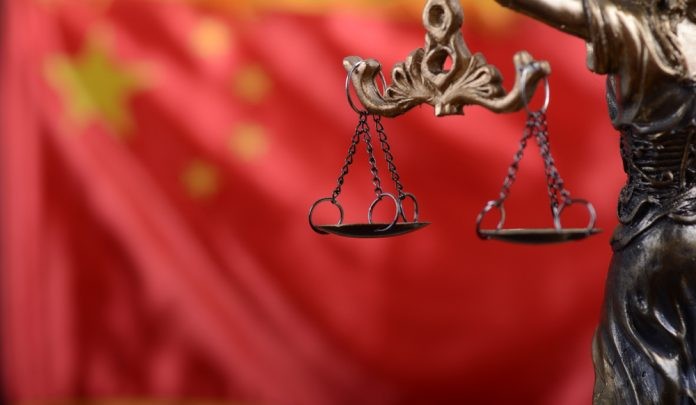Review №6 on Chinese Antitrust News from BRICS Antimonopoly Centre Experts
- Antimonopoly objectives for the year
- Algorithm regulations come into force
- Layered connections in the platform economy
- 10 trends in the digital economy
- Increasing digital literacy
- Yahoo ceases operations in China
- China encourages scientific and technological innovation
- Regulation of "pop-up" news
- Third Anniversary of the Intellectual Property Court
- Food delivery platforms cut fees
- How Meituan Protects Platform Workers
- 50% of violations on financial platforms have already been eliminated
- Tencent aims for carbon neutrality
- WeChat to cut payment service fees
Antimonopoly objectives for the year
The sessions of the National People's Congress (NPC - Chinese Parliament) and the National Committee of the People's Political Consultative Council of China - an advisory body under the NPC will last from March 4th to 11th. In 2022, the “two sessions” are held under the slogan “Putting stability first. Achieving progress in stability. Based on the results of an online survey of more than 5 million people, the 10 most important topics for users were identified.
Premier of the State Council of the People's Republic of China Li Keqiang has already made a working report. Summing up the work over the past year, he specifically noted the strengthening of regulation and the introduction of innovative regulatory solutions, the fight against monopolistic practices and counteracting the indiscriminate expansion of capital, and the protection of fair competition. Among the tasks for 2022, Li Keqiang mentioned, among other things: correctly understand and master the characteristic features of capital and the laws of its behaviour; to support and guide the healthy and regulated development of capital; deeply promote the implementation of a fair competition policy; strengthen the fight against monopolistic practices and unfair competition; protect a fair and orderly market environment; guide large platforms to reduce commissions and fees to reduce pressure on small and medium-sized businesses.
Before the meetings began, many members of the advisory body presented their innovative proposals for regulating the Internet: for example, to create a national system of standards for regulating antitrust compliance of platforms, or to form an emergency response system for digital security threats.
Source: Gov.cn
Algorithm regulations come into force
On March 1st, the “Statement on the regulation of algorithmic recommendations in the provision of Internet information services” came into force. The regulations, in particular, establish that algorithmic recommendation service providers are prohibited from using algorithms to interfere with the display of information (blocking of information, excessive recommendations, manipulation of ratings, etc.), to develop Internet addiction in minors and to apply differentiated terms of transactions.
The system of registration of algorithms has already been launched. According to Article 24 of the “Statement”, algorithmic recommendation service providers “related to public opinion platforms or capable of mobilizing the public” are required to enter their data into the system: name of the provider, type of service, scope, type of algorithm, algorithm self-assessment report and others.
Layered connections in the platform economy
Xinhua's Economic Information Daily published an article about the format of the various connections that arise in the platform economy and are necessary for its healthy development. The relationship between digital platforms should be "orderly competition", the relationship between the platform and service providers on the platform should be a more equal symbiosis, the relationship between the platform and users should be more conscientious consumer protection, and the relationship between the platform and the regulator should be more effective joint governance. It is emphasized that the platform interacts with the supervisory authorities not just as “the regulated and the regulator”: external regulation is often possible precisely with the active cooperation of the platform. Article published on behalf of the Academy of Management, Beijing Institute of Social Sciences.
Source: Dz.jjckb
10 trends in the digital economy
The Paper wrote about 10 major trends that will be observed in the development of China's digital economy this year:
- accelerating the distribution of data as a factor of production;
- development of infrastructure and search for innovative formats for its application;
- accelerating the intersection of digital sciences with natural ones (life sciences, materials science, etc.), interpenetration with social sciences;
- the beginning of the implementation of the three-year plan for the reform of the scientific and technical apparatus;
- penetration of primitive digital assets into all industries;
- the emergence of numerous third-party data service industries in areas where the industrialization of data and digital technologies is taking place;
- new formats of data industrialization on consumer platforms; stopping the "erratic growth" of the platform economy on the Internet; the emergence of new e-commerce platforms based on digital credit systems;
- start of comprehensive digitalization of traditional supply chains;
- accelerating the digitalization of the agrarian industry;
- improvement of the system of digital public administration and regulation.
Source: The paper
Increasing digital literacy
The Cyberspace Administration, together with the Ministry of Education, the Ministry of Industry and Informatization, and the Ministry of Human Resources and Social Security, have published the Key Tasks for Increasing Digital Literacy of the Population for 2022. The measures are aimed at a more complete supply of digital resources, the primary formation of a digital education system for all ages, improving the digital skills of workers, raising the level of "digital life" and the civilization of the "digital society".
Source: Politics.people
Yahoo ceases operations in China
Yahoo Mail has announced that after February 28th, its services will no longer be available in mainland China. Users received a newsletter from the company stating that they "will no longer be able to send or receive new emails from mainland China or download data". Internet users called this event "the end of an era". About the planned termination of work in China "due to the increasingly difficult situation in the field of business and legislation in China," Yahoo announced in early November last year.
Source: Baijiahao
China encourages scientific and technological innovation
Minister of Science and Technology Wang Zhigang said more companies should get involved in innovative scientific research and increase investment in R&D. The ministry will provide additional support to businesses so that they can more actively create technological innovations and commercialize research results. Public and private companies will have equal innovation opportunities. 3/4 of investment in R&D in China comes from private businesses.
Source: YiCai
Regulation of "pop-up" news
The Cyberspace Administration has released a draft Regulation on regulating the promotion of information in the form of "pop-up" windows. Information service providers in this form are required to obtain a special license, as well as create a mechanism to ensure cybersecurity, data security and personal information. In addition, news platforms are prohibited from promoting “unhealthy” content (for example, sending information to teenagers that is harmful to their health), distorting the true meaning of headlines, etc. All pop-up news must be checked manually. Pop-up ads must be labelled "advertising content".
Further, the Ministry of Industry and Informatization held a meeting with unnamed Internet companies, where they noted a common violation: some service providers advertise their applications in pop-up windows and force users to download them in order to read the text in full. The agency called for an end to coercion and a highly visible "cancel" button when recommending apps. It is also forbidden to interrupt "Internet surfing" by forcing the transition to the application store.
Source: Globaltimes.cn, Yicaiglobal
Third Anniversary of the Intellectual Property Court
The Intellectual Property Court of the Supreme People's Court of China was established on January 1st, 2019. In honour of the third anniversary of the court, its vice-chairmen spoke about the interim results of the activity. They noted that the IP Court has always strengthened justice in relation to anti-competitive practices and unfair competition, and has been engaged in the protection of trade secrets. From 2019 to 2022, 309 relevant claims were accepted and a decision was made on 215 of them. The Court also prepares judicial interpretations on trade secret protection and unfair competition hearings. In the future, it is planned to contribute to the improvement of the competition law system based on high standards, as well as to strengthen cooperation between justice and administrative law enforcement.
Source: Weixin.qq
Food delivery platforms cut fees
Meituan announced that for restaurants in regions heavily affected by the pandemic (daily transaction volume fell by more than 30%), the platform's technical service fees will be halved and will not exceed 1 yuan per order. Additionally, measures are being introduced to support small and medium-sized entrepreneurs who are experiencing difficulties and who are participants in the fee transparency program: from March to December, the maximum commission for them will be 5% - it is expected that this measure will help more than 1 million businesses. In addition, it is planned to expand the mentioned transparency program to the scale of the whole country. Currently, it covers only 70% of entrepreneurs.
Meituan competitor Ele.me is also introducing support measures. As a first step, it will invest 20 million yuan to completely or partially exempt restaurants from 87 high-risk counties. “We hope to take real action to help businesses affected by the pandemic,” the company said.
On Feb. 18, the Development and Reform Committee required food delivery services to lower fees for serving food service providers to reduce their costs, as part of measures to restore the affected [pandemic] industries in the service sector.
Sources: Baijiahao
How Meituan Protects Platform Workers
Food delivery service Meituan has published the first report on its social responsibility to safeguard the rights and interests of couriers. In the report, the company describes itself as a "gas station for employment", a "protector of the home", a "companion at work", and a "dream engine". Its main achievements are listed, including the improvement of social guarantees, the shift from "strict" to "neutral" algorithms, the improvement of communication channels and the improvement of labour safety.
Meituan also reported that a new mechanism for evaluating the quality of courier work was launched in test mode in 15 cities in China: now, for bad reviews, no fines are applied, but points are reduced, and a general conclusion on the quality of work is made at the end of the month. This reduces the negative impact of random incidents on the income of couriers.
Source: Weixin
50% of violations on financial platforms have already been eliminated
On March 2nd, Guo Shuqing, chairman of the Banking and Insurance Supervision Committee, said that 2021 has become a landmark year in the history of the party and the state. In particular, a stubborn struggle was waged against the "disorderly expansion" of capital in the financial sector. The agencies stressed the simultaneous importance of regulation and development, the obligation to engage in innovative financial activities only if they were carefully monitored, and paid attention to the equal treatment of all activities and market entities. The financial transactions of Internet platforms have been fully brought into the area of regulatory control and oversight. The Committee treats violations with zero tolerance: more than a thousand problems were pointed out to 14 Internet platforms, about half of which have already been properly eliminated, and even more clear progress is expected before the end of this year.
Tencent aims for carbon neutrality
On February 24th, Internet giant Tencent launched the Net Zero campaign and committed to achieving full carbon neutrality of its operations and supply chains by 2030, as well as switching to 100% green electricity. Tencent CEO Pony Ma stated that the goal is to promote a low-carbon lifestyle, promote the transformation of traditional industries, use "Chinese wisdom" in the overall fight against climate change.
Baidu announced its goal of carbon neutrality by 2030 last June, followed by Alibaba in December.
Source: Baijiahao
WeChat to cut payment service fees
For micro and small companies and individual entrepreneurs that meet the requirements of the Ministry of Industry and Informatization, the fee for processing payments through WeChat Pay will be 10% lower than the standard fee.
Previously, the Central Bank of China required all persons engaged in entrepreneurial activities to change QR codes for receiving mobile payments from “personal” to “business” by March 1st, 2022, but subsequently made its requirement optional: now WeChat Pay and Alipay offer a transition to “business code" in optional mode.
Source: Baijiahao




